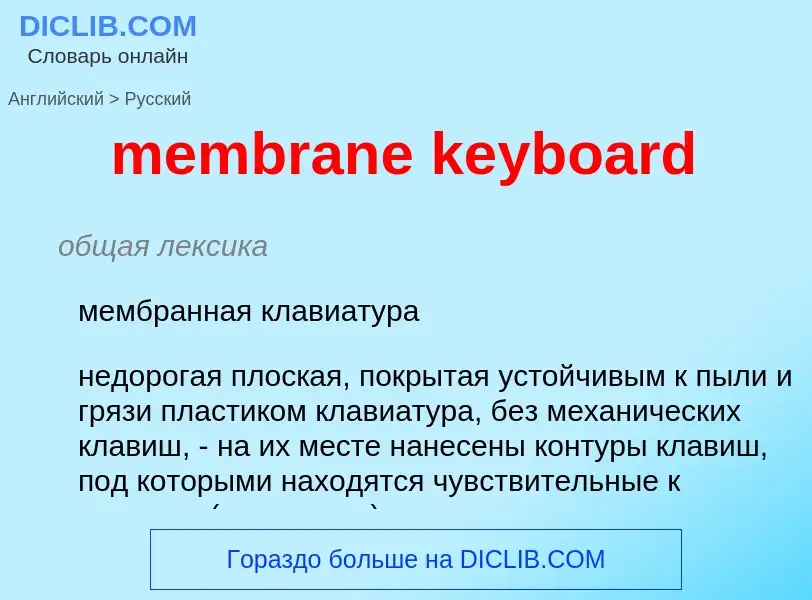Translation and analysis of words by ChatGPT artificial intelligence
On this page you can get a detailed analysis of a word or phrase, produced by the best artificial intelligence technology to date:
- how the word is used
- frequency of use
- it is used more often in oral or written speech
- word translation options
- usage examples (several phrases with translation)
- etymology
membrane keyboard - translation to English
общая лексика
мембранная клавиатура
недорогая плоская, покрытая устойчивым к пыли и грязи пластиком клавиатура, без механических клавиш, - на их месте нанесены контуры клавиш, под которыми находятся чувствительные к нажатию (сенсорные) зоны
Смотрите также
общая лексика
миниатюрная клавиатура
с небольшими прямоугольными или ромбовидными резиновыми или пластмассовыми клавишами (у калькуляторов)
chiclet - название жевательной резинки, пластинки которой по форме похожи на клавиши этой клавиатуры
Смотрите также
общая лексика
базальная мембрана
Definition

Wikipedia

A membrane keyboard is a computer keyboard whose "keys" are not separate, moving parts, as with the majority of other keyboards, but rather are pressure pads that have only outlines and symbols printed on a flat, flexible surface. Very little, if any, tactile feedback is felt when using such a keyboard.
Membrane keyboards work by electrical contact between the keyboard surface and the underlying circuits when keytop areas are pressed. These models were used with some early 1980s home computers, enjoying wide adoption in consumer electronics devices. The keyboards are quite inexpensive to mass-produce, and are more resistant against dirt and liquids than most other keyboards. However, due to a low or non-existent tactile feedback, most people have difficulty typing with them, especially when larger numbers of characters are being typed. Chiclet keyboards were a slight improvement, at least allowing individual keys to be felt to some extent.
Aside from early hobbyist/kit/home computers and some video game consoles, membrane-based QWERTY keyboards are used in some industrial computer systems, and are also found as portable, even "rollable-collapsible" designs for PDAs and other pocket computing devices. Smaller, specialised membrane keyboards, typically numeric-and-a-few-control-keys only, have been used in access control systems (for buildings and restricted areas), simple handheld calculators, domestic remote control keypads, microwave ovens, and other similar devices where the amount of typing is relatively small or infrequent, such as cell phones.
Modern PC keyboards are essentially a membrane keyboard mechanism covered with an array of dome switches which give positive tactile feedback.






